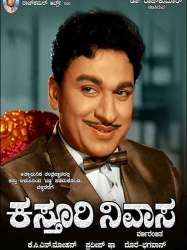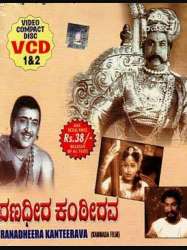Sedige Sedu (1969)

Si vous aimez ce film, faites-le savoir !
Sedige Sedu (Kannada: ಸೇಡಿಗೆ ಸೇಡು) is a 1970 Indian Kannada film, directed by A V Sheshagiri Rao and produced by K Krishnaiah Naidu. The film stars Udaykumar, Jayanthi, T. N. Balakrishna and Narasimharaju in lead roles. The film had musical score by Chellapilla Satyam.
Acteurs
Commentaires
Postez un commentaire :
Suggestions de films similaires à Sedige Sedu
Il y a 335 films ayant les mêmes acteurs, pour avoir au final 70 suggestions de films similaires.Si vous avez aimé Sedige Sedu, vous aimerez sûrement les films similaires suivants :

Kasturi Nivasa (1971)
, 2h32Genres Drame
Acteurs Rajkumar, K. S. Ashwath, Jayanthi, T. R. Narasimharaju, Udaykumar, T. N. Balakrishna
Note88%





Ravi Varma (Rajkumar), owner of a match box factory is a widower and has lost his daughter in an accident. Recognizing that his honest employee Chandru is in a similar position, he decides to help Chandru financially. As Chandru attends training in the U.S., Ravi takes care of Chandru's charming daughter. On return, Chandru suggests changing the company's structure. The traditionalist Ravi, becomes infuriated. Protesting this, Chandru resigns and starts his own match box company and becomes the leading match box manufacturer.

Chakra Theertha (1966)
, 2h31Réalisé par Peketi Sivaram
Acteurs Rajkumar, Udaykumar, Jayanthi, T. N. Balakrishna, Master Prabhakar, B. Jayashree

Mana Mecchida Madadi (1962)
Acteurs Rajkumar, Udaykumar, K. S. Ashwath, T. N. Balakrishna, T. R. Narasimharaju, Leelavathi

Rajashekara (1966)
, 2h53Réalisé par Ganapathi Venkatrama Iyer
Acteurs Rajkumar, Udaykumar, T. N. Balakrishna, T. R. Narasimharaju, Bharathi Vishnuvardhan, K. Raghavendra Rao

Chikkamma (1968)
, 2h17Acteurs Rajkumar, Jayanthi, T. N. Balakrishna, T. R. Narasimharaju, Srinath, Vijayalalitha

Ranadheera Kanteerava (1959)
, 2h21Genres Biographie
Acteurs Rajkumar, Leelavathi, K. S. Ashwath, Sandhya Shantaram, Udaykumar, T. N. Balakrishna
Note77%






Immadi pulikeshi (1967)
, 2h34Genres Drame, Biographie, Historique
Acteurs Rajkumar, T. N. Balakrishna, Udaykumar, Jayanthi, Kalpana Mohan, Kalpana
Note82%






Miss Leelavathi (1965)
, 2h42Acteurs Jayanthi, K. S. Ashwath, Udaykumar, Ramesh Aravind, T. R. Narasimharaju
This socially relevant movie explores the darkness of female sexuality on the screen. The lead protagonist Leelavathi (Jayanthi) is shown as a bold girl to a doting father (K. S. Ashwath) who is completely outright in wearing revealing attires and expressing her views about the pre-marital sexual acts. She also comes under many experimental circumstances in her life which makes the rest of the world highly critical about her. She is shown to finally succumb to the moral trappings of the time and her father is also ridiculed for being bringing her up more liberally.

Karuneye Kutumbada Kannu (1961)
Acteurs Rajkumar, Udaykumar, T. N. Balakrishna, T. R. Narasimharaju, Leelavathi, Rajasree
Note26%





 Connexion
Connexion


